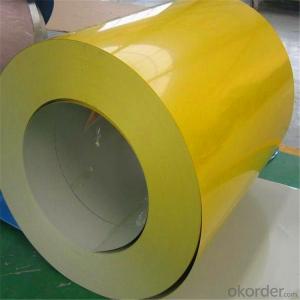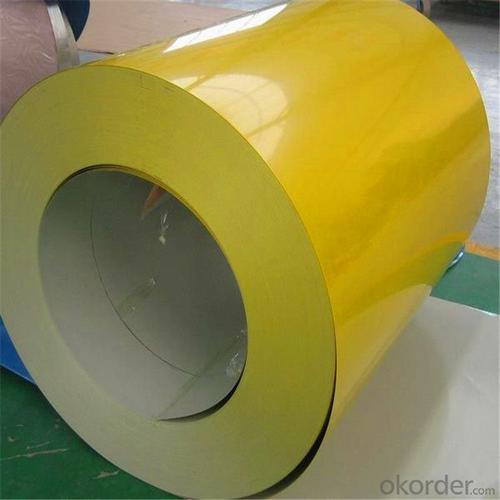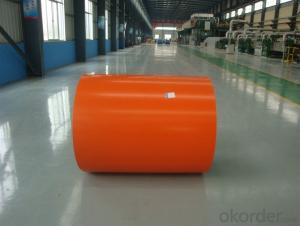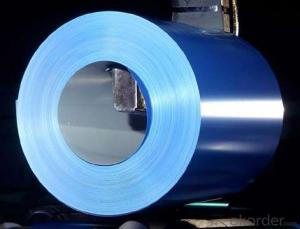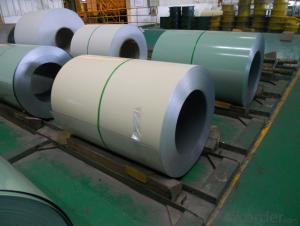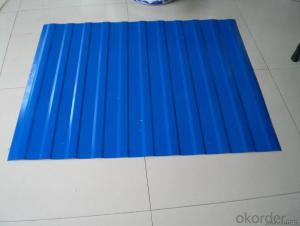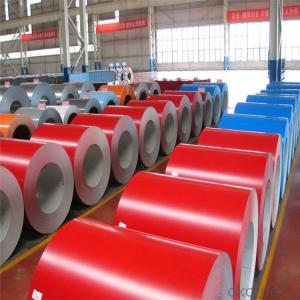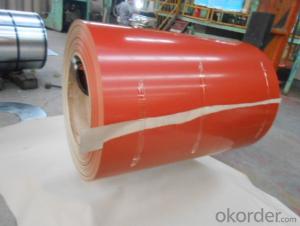PPGI Color Coated Coil Manufacturer
- Loading Port:
- Tianjin
- Payment Terms:
- TT OR LC
- Min Order Qty:
- 100 m.t.
- Supply Capability:
- 500000 m.t./month
OKorder Service Pledge
OKorder Financial Service
You Might Also Like
Specification
PPGI Color Coated Coil Manufacturer
Description of PPGI Color Coated Coil Manufacturer
Product | PPGI/PPGL |
Capacity | 5,000 tons/month |
Base material | Hot dipped galvanized steel |
Thickness | 0.2-2.0mm |
Width | 600-1250mm(according to your need) |
Coil Weight | 3-6tons |
Quality | SGCC, DX51D |
Color | RAL No. or customers samples’ color |
Zinc-coating | 30g/m2-180g/m2 |
Coil ID | 508mm/610mm |
Technique | Cold rolled—hot dipped galvanized—color coated |
Painting | Top painting:15~25μm |
Back painting: 6~10μm | |
Tolerance | Thickness: +/-0.02mm |
Width:+/-2mm | |
Shipment time | within 15-45 workdays |
Payment | T/T, L/C at sight |
Packing | Standard export packing |
The special order can be negotiated. | |
Application of PPGI Color Coated Coil Manufacturer
APPLICATION OF OUR PREPAINTED STEEL | ||||||||||
Construction | Outside | Workshop,agricultural warehouse,residential precast unit | ||||||||
corrugated roof,roller shutter door,rainwater drainage pipe,retailer booth | ||||||||||
Inside | Door,doorcase,light steel roof stucture,folding screen,elevator,stairway,ven gutter,Construction Wall | |||||||||
Electrical applicance | Refrigerator,washer,switch cabnet,instrument cabinet,air conditioning,micro-wave owen,bread maker | |||||||||
Fuiniture | Central heating slice,lampshade,chifforobe,desk,bed,locker,bookself | |||||||||
Carrying trade | Exterior decoration of auto and train,clapboard,container,isolation lairage,isolation board | |||||||||
Qthers | Writing panel,garbagecan,billboard,timekeeper,typewriter,instrument panel,weight sensor,photographic equipment | |||||||||
Products Show of PPGI Color Coated Coil Manufacturer

Product Advantages
1.With nearly 20 years experience in prepainted steel, accommodate different marketdemands. | ||||||||||||||
2.'Quality first, service first' is our business aim; 'The good faith get respect,cast quality market' is our Business philosophy . | ||||||||||||||
3.Having two series producttion line,with the abbual production capacity of 240000 tons. | ||||||||||||||
4.Exceed International ISO9001:2008&ISO14001:2004 quality and environmental standards | ||||||||||||||
5.Meet with ROHS standard |
Company Information
CNBM International Corporation is the most important trading platform of CNBM group.
Whith its advantages, CNBM International are mainly concentrate on Cement, Glass, Iron and Steel, Ceramics industries and devotes herself for supplying high qulity series of refractories as well as technical consultancies and logistics solutions.


F A Q
1, Your advantages?
professional products inquiry, products knowledge train (for agents), smooth goods delivery, excellent customer solution proposale
2, Test & Certificate?
SGS test is available, customer inspection before shipping is welcome, third party inspection is no problem
3, Factory or Trading Company?
CNBM is a trading company but we have so many protocol factories and CNBM works as a trading department of these factories. Also CNBM is the holding company of many factories.
4, Payment Terms?
30% TT as deposit and 70% before delivery.
Irrevocable L/C at sight.
5, Trading Terms?
EXW, FOB, CIF, FFR, CNF
6, After-sale Service?
CNBM provides the services and support you need for every step of our cooperation. We're the business partner you can trust.
For any problem, please kindly contact us at any your convenient time.
We'll reply you in our first priority within 24 hours.
- Q: What is the significance of carbon content in special steel?
- The carbon content in special steel is significant as it directly impacts the steel's strength, hardness, and overall performance. A higher carbon content typically results in a harder and stronger steel, making it suitable for applications that require durability and wear resistance, such as cutting tools or machinery components. On the other hand, a lower carbon content enhances the steel's toughness and ductility, making it more suitable for applications that require flexibility, such as structural components or automotive parts. Therefore, controlling the carbon content in special steel is crucial in tailoring its properties to meet specific industrial requirements.
- Q: How does special steel perform in extreme weather conditions?
- Special steel is designed to perform exceptionally well in extreme weather conditions. It has high resistance to corrosion, which means it can withstand exposure to harsh elements such as rain, snow, and saltwater without deteriorating. Additionally, special steels exhibit excellent strength and toughness, allowing them to maintain their structural integrity even in extreme temperatures, such as intense heat or freezing cold. Overall, special steel is a reliable and durable material that excels in challenging weather environments.
- Q: How does precipitation-hardening steel achieve high strength through heat treatment?
- Precipitation-hardening steel achieves high strength through heat treatment by a process called aging. This involves heating the steel to a specific temperature and holding it there for a certain period of time, followed by rapid cooling. During this process, the alloying elements in the steel form fine particle precipitates, which obstruct the movement of dislocations within the crystal structure. These precipitates act as barriers that hinder the deformation of the material, resulting in increased strength.
- Q: Can special steel be used in the production of cutting tools?
- Yes, special steel can be used in the production of cutting tools.
- Q: What are the different methods of controlling the grain size in special steel?
- There are several methods to control the grain size in special steel, aiming to achieve the desired mechanical properties and performance. Some of these methods include: 1. Alloying: By carefully selecting and controlling the composition of alloying elements in the steel, the grain size can be controlled. For example, elements such as niobium, vanadium, and titanium can effectively refine the grain size. 2. Heat treatment: The heat treatment process plays a crucial role in controlling the grain size. Techniques like annealing, normalizing, and quenching can be employed to manipulate the grain size. For instance, slow cooling during annealing promotes the growth of larger grains, while rapid cooling during quenching can lead to smaller grain sizes. 3. Deformation processing: Applying mechanical deformation, such as rolling, forging, or extrusion, can help refine the grain structure. These processes induce strain and promote the formation of smaller and more uniform grains. 4. Grain growth inhibitors: Adding certain elements to the steel, such as aluminum or zirconium, can act as grain growth inhibitors. These elements form fine particles that impede grain growth during heat treatment, resulting in a smaller grain size. 5. Transformation temperature control: By controlling the transformation temperature during heat treatment, the grain size can be manipulated. For example, lowering the austenitizing temperature can produce a finer grain structure in the final product. 6. Rapid solidification: Utilizing techniques like spray forming or rapid quenching can result in an ultrafine-grained microstructure. The rapid cooling prevents grain growth, leading to a fine and homogeneous grain structure. 7. Severe plastic deformation (SPD) techniques: SPD techniques, such as equal channel angular pressing (ECAP) or high-pressure torsion (HPT), can impose significant strain on the material, leading to a refined grain structure. These techniques are typically used for producing ultrafine-grained or nanostructured steels. It is important to note that the choice of the method for controlling grain size in special steel depends on the desired properties, the alloy composition, and the intended application of the final product.
- Q: What is the role of special steel in the automotive industry?
- Special steel plays a crucial role in the automotive industry as it is used in various components and parts of vehicles. Its exceptional strength, durability, and resistance to wear and corrosion make it ideal for applications such as engine components, suspension systems, and safety features. Special steel also enables automakers to reduce vehicle weight, improve fuel efficiency, and enhance overall performance and safety.
- Q: What are the main characteristics of structural steel forgings?
- The main characteristics of structural steel forgings include high strength, excellent toughness, and superior fatigue resistance. They are also known for their ability to withstand extreme temperatures and harsh environments. Moreover, structural steel forgings exhibit good weldability and machinability, making them suitable for various engineering applications.
- Q: What are the different methods of joining special steel components?
- Various techniques exist for joining special steel components, each offering unique advantages and applications. Welding, brazing, soldering, mechanical fastening, and adhesive bonding are among the most commonly used methods. 1. Welding represents a widely employed method for joining special steel components. It involves melting the base metals and adding a filler material to create a robust bond. Depending on the specific requirements and properties of the steel components, different welding techniques like arc welding, gas welding, or laser welding can be utilized. 2. Brazing utilizes a filler material with a lower melting point than the base metals. This material is heated and distributed between the components, forming a strong bond as it solidifies. Brazing is particularly suitable for high-temperature applications and can be performed using a torch, furnace, or induction heating. 3. Soldering is similar to brazing but employs a lower melting point filler material known as solder. It finds common use in electrical and electronic applications, as well as for joining small or delicate steel components. Soldering necessitates less heat and can be accomplished using a soldering iron or hot air gun. 4. Mechanical fastening involves joining components using mechanical means such as screws, bolts, nuts, or rivets. This method is often preferred when disassembly or reassembly is necessary, as it allows for easy removal and replacement of components. Mechanical fastening is suitable for applications requiring a strong and reliable joint, especially when welding or brazing may not be feasible. 5. Adhesive bonding is another method employed for joining special steel components. It entails applying an adhesive material to the mating surfaces, which then cures or hardens to create a robust bond. Adhesive bonding is commonly used when a continuous joint is required or when joining dissimilar materials. It offers advantages in applications necessitating vibration damping or sealing. The selection of the appropriate joining method depends on various factors such as the specific requirements of the application, the properties of the steel components, and the desired strength and durability of the joint. Each method has its own strengths and limitations.
- Q: How does the hardness of special steel affect its performance?
- The hardness of special steel plays a crucial role in determining its performance. The hardness of steel refers to its ability to resist indentation, scratching, or deformation during use. This property is directly related to the steel's microstructure and the amount of carbon present in it. When special steel is hardened, it undergoes a process called heat treatment, typically involving rapid cooling or quenching after being heated to high temperatures. This process alters the steel's microstructure, resulting in a harder material. The increased hardness provides several benefits to the performance of special steel. Firstly, a higher hardness level enhances the wear resistance of special steel. This is particularly important in applications where the steel is subjected to abrasive or erosive forces, such as cutting tools or machinery components. A harder steel can withstand these forces without significant wear or damage, resulting in improved longevity and reliability. Secondly, the hardness of special steel affects its strength and toughness. A harder steel generally exhibits higher strength, meaning it can withstand greater forces without permanent deformation or failure. This property is advantageous in applications where the steel is subjected to heavy loads or impacts. Additionally, a certain level of toughness is necessary to prevent brittle fractures. While high hardness can make a steel more brittle, careful heat treatment can balance the hardness and toughness, ensuring the steel remains strong and resistant to fracture. Furthermore, the hardness of special steel also affects its machinability. Hardened steel can be more challenging to machine due to its increased resistance to cutting tools. However, it offers greater dimensional stability and precision during machining operations, leading to more accurate and consistent results. In summary, the hardness of special steel significantly impacts its performance. A higher hardness level provides improved wear resistance, strength, and toughness, making it suitable for demanding applications. However, the balance between hardness and toughness needs to be carefully considered to avoid brittleness. Therefore, understanding and controlling the hardness of special steel is essential to optimize its performance in various industries.
- Q: What are the different heat treatment grades of special steel?
- There are several different heat treatment grades of special steel, each with its own unique properties and applications. Some of the commonly used heat treatment grades include: 1. Annealed Steel: This grade of special steel is treated through the annealing process, which involves heating the steel to a specific temperature and then cooling it slowly to enhance its ductility and reduce its hardness. Annealed steel is typically used in applications where toughness and machinability are required. 2. Normalized Steel: Normalizing is a heat treatment process that involves heating the steel above its critical temperature and then cooling it in still air. This treatment refines the grain structure of the steel, improves its mechanical properties, and reduces internal stresses. Normalized steel is often used in applications where high strength and good weldability are desired. 3. Quenched and Tempered Steel: This grade of special steel undergoes a two-step heat treatment process. Firstly, the steel is heated to a high temperature and then rapidly cooled in a quenching medium such as oil or water. This process results in a hardened and brittle steel. To regain some toughness and reduce brittleness, the steel is then tempered by reheating it to a lower temperature. Quenched and tempered steel is commonly used in applications that require high strength, such as construction machinery, mining equipment, and automotive parts. 4. Precipitation Hardening Steel: This grade of special steel is treated by a combination of heat treatment and precipitation hardening. The steel is initially solution treated at high temperatures to dissolve alloying elements, followed by rapid cooling to retain a supersaturated solid solution. Subsequently, the steel is aged at a lower temperature for a specific period of time, allowing the formation of fine precipitates that contribute to increased strength and hardness. Precipitation hardening steel is utilized in applications where high strength and corrosion resistance are essential, such as aerospace components and high-performance tools. 5. Case Hardening Steel: Case hardening is a surface heat treatment process used to increase the hardness of the outer layer of steel while maintaining a tough and ductile core. This is achieved by carburizing or nitriding the steel, which introduces carbon or nitrogen into the surface layer, respectively. Case hardening steel is commonly used in applications requiring wear resistance, such as gears, bearings, and camshafts. These are just a few examples of the various heat treatment grades available in special steel. Each grade offers unique properties and advantages, allowing for a wide range of applications across different industries.
Send your message to us
PPGI Color Coated Coil Manufacturer
- Loading Port:
- Tianjin
- Payment Terms:
- TT OR LC
- Min Order Qty:
- 100 m.t.
- Supply Capability:
- 500000 m.t./month
OKorder Service Pledge
OKorder Financial Service
Similar products
Hot products
Hot Searches
Related keywords
